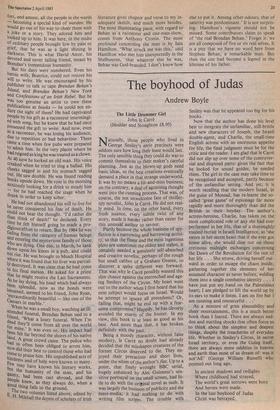The boyhood of Judas
Andrew Boyle
The Little Drummer Girl John le Carre (Hodder and Stoughton £8.95)
Naturally, those people who lived in George Smiley's eerie precincts were seldom sure how long their lease would last. The only sensible thing they could do was to commit themselves to their maker's careful planning. Just as the blown-up gods need basic ideas, so the best creations eventually demand a place in that strange underworld. It was by no means a hit-and-miss business; on the contrary, a deal of agonising thought went into the cunning process. That was, of course, the not unwelcome fate of thriller- spy novelist, John le Carre. He did not real- ly mind. In time, on the other hand, every fresh nuance, every subtle twist of any story, made it harder rather than easier for this unusual author to savour.
Partly because the whole business of spy- fiction is a narrowing and harrowing activi- ty, so that the finest and the most ingenious plots are sometimes the oldest and stalest, it certainly needed a genuinely self-absorbed and creative novelist, perhaps of the rough but small calibre of a Graham Greene, to discover a quite different way forward. That was why le Carre possibly wanted this slim chance against the entrenched and age- ing Smileys of the Circus. My heart went out to the author when I first heard that his next subject would focus on Israel. Would he attempt to ignore all precedents? Or, failing that, might he end up with a fear- some compromise? Happily, he has cleverly avoided the snares of the hunter. In my view, this book is at least as good as his best. And more than that, it has broken definitely with the past.
Being a moody character, without false modesty, le Carte no doubt had already decided that the misshapen creatures of the former Circus deserved to die. They en- joyed their precarious and short lives, under the whim of the author's fiat. Up to a point, that finely wrought BBC serial, hugely enhanced by Alec Guinness's sen- sitive portrayal on the small screen, had lit- tle to do with the original novel as such. It was largely the business of publicity and the mass-media; it had nothing to do with writing film scripts. The trouble with
Smiley was that he appeared too big for his books.
Now that the author has done his level best to integrate the unfamiliar, still-brittle and new characters of Joseph, the Israeli double-agent, and Charlie, the small-time English actress with an enormous appetite for life, the final judgment must be for the critic and the reader. I am glad that le Carre did not slip up over some of the controver- sial and disputed parts: given the fact that he looked for sound guides, he needed them. The girl in the case may take time to be recognised and accepted, partly because of the unfamiliar setting. And yet, it is worth recalling that the modern Israel, in the guise of Mossad, has re-learnt the so- called 'great game' of espionage far more rapidly and more thoroughly than did the British in their heyday. The author's actress-heroine, Charlie, has taken on the most complicated role of any she had ever performed in her life, that of a thoroughly trained recruit in Israeli Intelligence, so 'she swore in her secret heart that if she ever got home alive, she would dine out on those cretinous midnight exchanges concerning the Dawn of the Revolution for the rest of her life . . . She strove, driving herself out- ward in order to escape the chaos inside; gathering together the elements of her assumed character as never before, welding them into a single combative identity . . . I have just put my hand on the Palestinian heart; I am pledged to lift the world up by its ears to make it listen. I am on fire but I am cunning and resourceful. .
As a mixture of grim plausability and sheer entertainment, this is a much better book than I feared. There are always sud- den and startling shocks that often force us to think about the simplest and deepest things, despite the treacheries of everyday life. Whether in Smiley's Circus, in secret Israel territory, or even the Gulag itself, there are always more oddities in heaven and earth than most of us dream of: was it not'AE' (George William Russell) who pointed out long ago,
In ancient shadows and twilights Where childhood had strayed, The world's great sorrows were born And heroes were made.
In the lost boyhood of Judas Christ was betrayed.






































 Previous page
Previous page